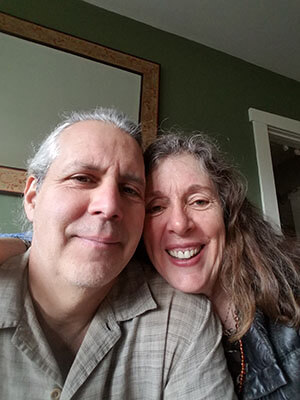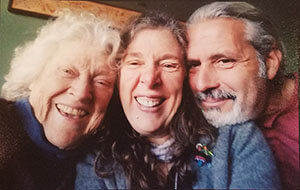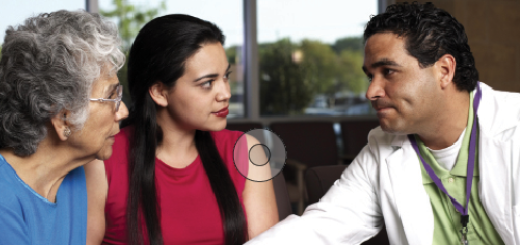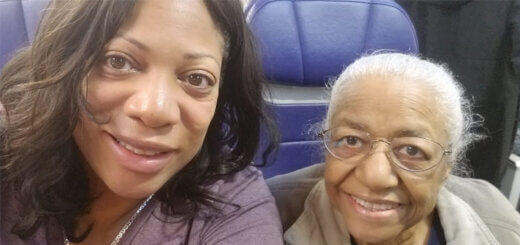Oakland woman cares for husband and mother both living with dementia
We introduced you to Claudia and Bud, Alzheimer’s Association® volunteer advocates, in last week’s blog which discussed Bud’s diagnosis and his participation in a clinical trial. This week, we’d like to highlight the work Claudia has done as a caregiver. Claudia is not only supporting Bud, but she also cares for her mother, Darlene, who is also having trouble with her memory. Claudia told us how she cares for herself and offered tips for other caregivers.
Bud and Claudia
Bud was in his late 40s when he and his wife Claudia began noticing symptoms. Because of his young age, Bud had a difficult time convincing his doctor something was wrong with his memory. Bud was diagnosed with Alzheimer’s in his early 50s and was able to get into the Aducanumab (Aduhelm™) clinical trial in 2017. Bud and Claudia became Alzheimer’s Association advocates to make an impact on finding a cure for this disease.
A fall and a fire
In 2018, with the clinical trial ongoing, Claudia and Bud took a trip to visit family on the East Coast. While on vacation, Claudia received a phone call that her mother, Darlene, had fallen and fractured a vertebra in her back.
Claudia and Bud were scrambling to get to Darlene when they heard news of the Camp Fire in Paradise, CA, where she lived. “We heard that she’d hurt her back and we were trying to get back to her. Then the fire broke out,” said Claudia. “I was worried because she was stuck in bed, couldn’t move and was in a lot of pain. Luckily, she had friends who rescued her.”
Noticing the signs
Darlene was a single mother who raised Claudia on her own. She was creative and excelled in quilting, weaving and pottery. Darlene was also great with math and used to work in bank. After remarrying, she and her husband built their home in Paradise. While he died in the 1990s, Darlene continued to live in her Paradise home until the fire.
After the fire, Darlene didn’t want to go back to her home. Instead, she moved in with Claudia and Bud permanently. It was then that Claudia noticed that something wasn’t right.
“I was repeating myself a lot,” said Claudia. “When I cleaned out her house after the fire, I found that she had stocked WAY too much food, much of it stale or past its expiration date. Papers that she’d meant to file were piled up in her office.”
While Darlene has not been formally diagnosed, Claudia has noticed issues with Darlene’s memory. “Since moving in with us her memory has gotten worse,” said Claudia. “She was a math whiz and now she has trouble balancing her check book.
“She crochets to keep herself busy, but she can’t make an overall plan for her shapes and color choices. She was an avid reader, but the last book she started she hasn’t finished after two years. Mom can’t handle much on her own anymore.”
A helping hand
Luckily, Bud is still able to help Claudia. “Bud does many chores to keep our household going,” said Claudia. “He often prepares our breakfast and does clean-up after meals.”
Bud also helps take care of Darlene. He goes on walks with her, carries things for her and makes sure she gets to her bedroom safely at night. Claudia says, “He is always helpful with her and helps keep her in a positive attitude.”
Taking care of herself
According to the Alzheimer’s Association 2021 Alzheimer’s Disease Facts and Figures report, 74% of caregivers of people living with Alzheimer’s or other dementias reported that they were “somewhat concerned” to “very concerned” about maintaining their own health since becoming a caregiver. A 2017 poll found that 27% of dementia caregivers delayed or did not do things they should to maintain their own health. Fifty-nine percent of family caregivers of people living with Alzheimer’s or other dementias rated the emotional stress of caregiving as high or very high.
Taking care of one person living with dementia can be a challenge, let alone two. That is why Claudia has prioritized taking care of herself.
Here are some of the things she’s doing to help relieve stress:
- Planning for the future. Claudia knows that things will get harder as the disease progresses for both her mother and husband. She finds it helpful to find resources she can use later. This includes things such as working with a financial planner or finding someone to provide in home care. Preparing for the future helps to put Claudia at ease.
- Creating balance in her life. Claudia dedicates one day a week to work on her task list. By doing this she can enjoy her week and also accomplish the tasks that need to get done.
- Seeking help. Claudia’s health insurance offers a short-term program that lets her to call in to speak to a therapist. This allows Claudia to talk with a professional about whatever is on her mind.
- Chatting with friends. Claudia has a good friend who lives nearby. Her friend is also caring for her mother. They help each other out when they can and support each other emotionally.
- Getting physical exercise. Claudia, Bud and Darlene go on walks regularly. This is good for everyone’s physical and mental health.
- Spending time with Bud. Claudia wants to enjoy this time with her husband as much as possible while they still can. They have a camper van that they like to travel in together and have several trips planned over the next year. Claudia and Bud’s son takes care of Darlene while they travel. Claudia loves that Bud can still make her laugh.
- Getting support from her family. Claudia and her sister communicate with one another about the latest Alzheimer’s research. This way they can stay up to date on things such as clinical trials.
Advice for caregivers
Claudia encourages other caregivers to breathe and to talk about the disease with friends and family. She suggests new caregivers check with their loved one’s employer to see if they offer disability insurance or the possibility to take a leave of absence while they work out a plan.
“It was incredibly helpful to me to find a good financial planner,” says Claudia. “You have a lot of financial decisions you’ll need to make.”
Most importantly, Claudia reminds caregivers to do fun things with their loved ones and enjoy each other’s company. “Bud and I need to live this time of our life,” said Claudia. “It’s going to go by, and we can’t not have this time together. We have a trip planned in Bessie the Wonder Van [the camper] to see sandhill cranes in the delta. We are excited to go out and do something.”
Caring for a person with Alzheimer’s or dementia often involves a team of people. Whether you provide daily caregiving, participate in decision making, or simply care about a person with the disease — we have resources to help. For more information, please visit alz.org/care or call our 24/7 Helpline at 800.272.3900.
Learn more:



















